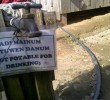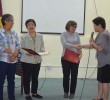“The Philippine Supreme Court must continue to rule on the seven pending petitions praying for the declaration of Presidential Proclamation No. 1959 as unconstitutional and void.”
This is the message of human rights lawyers from the Philippines, South Korea, Japan and India as they gather together for a three-day meeting, December 12-14, in preparation for next year’s Fifth Conference of Lawyers in Asia Pacific (Colap V) in Manila. This big international conference of lawyers in the region will discuss the theme of human rights in the midst of international economic crisis and conflict.
They added that the lifting of PP 1959 imposing martial law and suspending the privilege of the writ of habeas corpus in the province of Maguindanao does not change the fact that a mockery of the 1987 Philippine Constitution has been deliberately committed by executive officials led by President Gloria Macapagal-Arroyo in the issuance of PP 1959 without any factual basis at all.
Human rights law group National Union of Peoples’ Lawyers (NUPL), a lead petitioner in one of the seven petitions, shall host Colap V in September 2010 at Manila. Colap V is an international gathering of public interest and human rights lawyers of the International Association of Democratic Lawyers (IADL), which has a special consultative status with the Economic and Social Council (Ecosoc), the United Nations Educational, Scientific and Cultural Organization (Unesco) and the Unicef.
“Martial law may be imposed again on vague and invalid grounds if the Supreme Court will not rule on the issue of sufficiency of the factual basis of PP 1959 due to its formal lifting last Saturday.”
In its previous decision in the case of David v. Arroyo [G.R. No. 171396, May 3, 2006], the Supreme Court brushed aside the solicitor general’s contention that Proclamation No. 1017 declaring a state of national emergency has become moot and academic by its lifting during the pendency of several petitions assailing its constitutionality.
The Supreme Court declared in said case: “The Constitution is the supreme law. It was ordained by the people, the ultimate source of all political authority. It confers limited powers on the national government. x x x If the government consciously or unconsciously oversteps these limitations there must be some authority competent to hold it in control, to thwart its unconstitutional attempt, and thus to vindicate and preserve inviolate the will of the people as expressed in the Constitution. This power the courts exercise. This is the beginning and the end of the theory of judicial review.”
The proclamation of martial law and suspension of the privilege of the writ of habeas corpus do not suspend the operation of the Constitution. Thus, warrantless arrests may be done only if lawful cause exists as enumerated under the Rules of Criminal Procedure.
If there is no lawful cause, arrest should be made with a warrant. Thus, the Ampatuans who were arrested during the implementation of PP 1959 may easily question the manner by which they were arrested without any arrest warrant and the manner by which their mansions were searched without any search warrant.
“Thus, the theory of Justice Secretary Agnes Devanadera that warrantless arrest and search are allowed under martial law is not true. It is elementary that evidence obtained in the course of illegal searches and seizures are inadmissible in any proceedings. How do we expect the Ampatuans to be prosecuted for their alleged crimes if the high-powered guns and ammunitions obtained from their mansions in the numerous searches and seizures conducted by the military were done without any warrant during the time that PP 1959 was still operative? And the worse thing is the filing of rebellion charges against them when every Filipino knows that the Ampatuans are definitely not rebels.”
“That tells the kind of sincerity, or the lack of it, of Malacañang in the prosecution of the Ampatuans. And what is even frightening is that fact that Malacañang appears to have done all these things deliberately and in purpose. If the Ampatuans will get away with multiple murder, Malacañang has only itself to blame and the Filipino people will forever not forgive President Arroyo for ruining the cases against the Ampatuans. All these things only show that President Arroyo is complicit in the continued propagation of the system of impunity in the country.”
“This we will not allow especially since the two women lawyers slain in Ampatuan town massacre, Attys. Concepcio Brizuela and Cynthia Oquendo, were active members of NUPL.”
On December 14, Monday, the NUPL and the foreign lawyers together with the officers of the Integrated Bar of the Philippines (IBP) will hold a press conference at 10:00 AM at the IBP Building in Ortigas, Pasig City to demand for justice for the 57 innocent civilians, women, journalists and lawyers slaughtered in the Ampatuan town massacre, and to urge the Supreme Court to rule on the merits of the petitions against PP 1959 pending before it.
After the press conference, they will meet with Chief Justice Reynato S. Puno and Commission on Human Rights chairperson Leila De Lima.
For reference:
Atty. Edre Olalia
Deputy Secretary General for International Relations
National Union of Peoples’ Lawyers
0915-180-4632
IMPORTANT NOTICE: INBOX is an archive of press releases, statements, announcements, letters to the editors, and manifestos sent to Davao Today for publication. Please email your materials to davaotoday@gmail.com. Davao Today is not responsible for the content of these materials. The opinion expessed in these items does not reflect those of Davao Today and its staff. Please refer to our terms of use/disclaimer.










